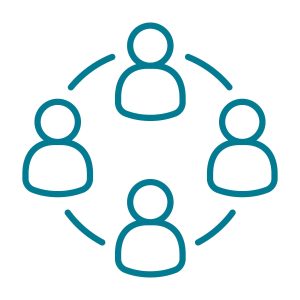About being an inclusive practitioner: Criteria and competency statements
INCLUSIVE PRACTITIONER (IP) competency

Innovative faculty are INCLUSIVE PRACTITIONERS.
They are emotionally attuned to the needs of learners and use empathy as a lens for their practice. They plan teaching and learning experiences with integrity and work to identify and reduce inequities and injustices that may impact student success. They inhabit a space of growth mindset and are open to knowledge outside of their disciplines to empower students. They understand the importance of equity, diversity, inclusion and belonging work and see indigenization as a key priority to transform post-secondary education. Faculty developing competence in their role as inclusive practitioners may do the following things.
Being inclusive is essential work in contemporary teaching and learning.
Georgian peers helped identify the key criteria associated with the INCLUSIVE PRACTITIONER role and work of faculty.
Key criteria:
|emotionally attuned| just | courageous | empowering|
Innovative Georgian College faculty include all learners in their learning spaces by creating a culture of belonging. They are just and courageous and will take a stand to support others. They are intentional in empowering students to contribute to student success.
Watch Faculty are inclusive practitioners.
Exemplar performance descriptors and competency statements
Faculty who are PRACTISING INCLUSION at an EMERGING level (IP-E) might demonstrate the following:
- Recognize the diversity of learners when developing effective learning environments.
- Respect all learners.
- Recognize the importance of vulnerability and uncertainty in the faculty role.
- Recognize the power and possibility they hold.
Faculty who are PRACTISING INCLUSION at a PERFORMING level (IP-P) might do the following:
- Use a growing array of skills to respond to a multi-faceted learning environment that ensures space for safety, challenge and growth.
- Foster a commitment to community standards and values while maintaining empathy and fairness.
- Cultivate opportunities and model risk taking in their teaching practice.
- Foster a learning environment where all are empowered to have their own agency and voice.
Faculty who are PRACTISING INCLUSION at a TRANSFORMING level (IP-T) might do the following:
- Inspire and mentor others to invest in their own inclusive practice and commitment towards change.
- Seize opportunities to model values in decision making in their work.
- Be transparent and humble in reflecting the uncertainties and course corrections of their professional journey.
- Empower peers to be allies and agents of inclusive practice.
Please note that these descriptors are not exhaustive. Faculty demonstrate this competency in numerous ways, all of which are key to innovative teaching. Please share your exemplars as you describe how you are emerging, performing, or transforming the teaching and learning ecosystem.


